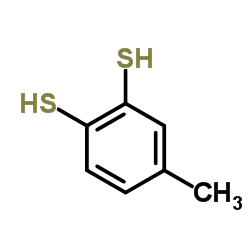14173-25-2
| Name | (methyldisulfanyl)benzene |
|---|---|
| Synonyms |
3,4-toluenedithiol
Methyl phenyl disulfide Methyl-phenyl-disulfid 4-Methyl-1,2-benzenedithiol Methyl phenyl disulphide phenylmethyl disulfide Disulfide,methyl phenyl 3,4-dimercaptotoluene MFCD00026035 4-methylbenzene-1,2-dithiol Phenyl-methyldisulfid |
| Density | 1.2±0.1 g/cm3 |
|---|---|
| Boiling Point | 265.5±20.0 °C at 760 mmHg |
| Molecular Formula | C7H8S2 |
| Molecular Weight | 156.268 |
| Flash Point | 122.8±15.7 °C |
| Exact Mass | 156.006744 |
| PSA | 50.60000 |
| LogP | 3.28 |
| Vapour Pressure | 0.0±0.5 mmHg at 25°C |
| Index of Refraction | 1.644 |
| Storage condition | Flammables area |
Synonym:Non Section 2 - COMPOSITION, INFORMATION ON INGREDIENTS
Risk Phrases: 10 Section 3 - HAZARDS IDENTIFICATION EMERGENCY OVERVIEW
Flammable.The toxicological properties of this material have not been fully investigated.Stench. Potential Health Effects Eye: May cause eye irritation. Skin: May cause skin irritation. Ingestion: No information found. Inhalation: May cause respiratory tract irritation. Chronic: No information found. Section 4 - FIRST AID MEASURES Eyes: Flush eyes with plenty of water for at least 15 minutes, occasionally lifting the upper and lower eyelids. Get medical aid immediately. Skin: Get medical aid. Flush skin with plenty of water for at least 15 minutes while removing contaminated clothing and shoes. Ingestion: If victim is conscious and alert, give 2-4 cupfuls of milk or water. Get medical aid immediately. Inhalation: Get medical aid immediately. Remove from exposure and move to fresh air immediately. If not breathing, give artificial respiration. If breathing is difficult, give oxygen. Notes to Physician: Section 5 - FIRE FIGHTING MEASURES General Information: As in any fire, wear a self-contained breathing apparatus in pressure-demand, MSHA/NIOSH (approved or equivalent), and full protective gear. Will burn if involved in a fire. Extinguishing Media: Use foam, dry chemical, or carbon dioxide. Section 6 - ACCIDENTAL RELEASE MEASURES General Information: Use proper personal protective equipment as indicated in Section 8. Spills/Leaks: Absorb spill with inert material (e.g. vermiculite, sand or earth), then place in suitable container. Section 7 - HANDLING and STORAGE Handling: Wash thoroughly after handling. Use only in a well-ventilated area. Use spark-proof tools and explosion proof equipment. Avoid contact with skin and eyes. Avoid ingestion and inhalation. Use only in a chemical fume hood. Storage: Keep away from sources of ignition. Store in a cool, dry place. Store in a tightly closed container. Flammables-area. Section 8 - EXPOSURE CONTROLS, PERSONAL PROTECTION Engineering Controls: Facilities storing or utilizing this material should be equipped with an eyewash facility and a safety shower. Use process enclosure, local exhaust ventilation, or other engineering controls to control airborne levels. Exposure Limits CAS# 14173-25-2: Personal Protective Equipment Eyes: Wear appropriate protective eyeglasses or chemical safety goggles as described by OSHA's eye and face protection regulations in 29 CFR 1910.133 or European Standard EN166. Skin: Wear appropriate protective gloves to prevent skin exposure. Clothing: Wear appropriate protective clothing to prevent skin exposure. Respirators: Follow the OSHA respirator regulations found in 29 CFR 1910.134 or European Standard EN 149. Use a NIOSH/MSHA or European Standard EN 149 approved respirator if exposure limits are exceeded or if irritation or other symptoms are experienced. Section 9 - PHYSICAL AND CHEMICAL PROPERTIES Physical State: Liquid Color: clear slightly yellow Odor: Rather pungent odor, reminiscent pH: Not available. Vapor Pressure: Not available. Viscosity: Not available. Boiling Point: 65 deg C @ 2.00mm Hg Freezing/Melting Point: Not available. Autoignition Temperature: Not available. Flash Point: 22 deg C ( 71.60 deg F) Explosion Limits, lower: Not available. Explosion Limits, upper: Not available. Decomposition Temperature: Solubility in water: insoluble Specific Gravity/Density: 1.1500g/cm3 Molecular Formula: C7H8S2 Molecular Weight: 156.26 Section 10 - STABILITY AND REACTIVITY Chemical Stability: Stable under normal temperatures and pressures. Conditions to Avoid: None reported. Incompatibilities with Other Materials: Strong oxidizing agents. Hazardous Decomposition Products: Carbon monoxide, oxides of sulfur, carbon dioxide. Hazardous Polymerization: Has not been reported. Section 11 - TOXICOLOGICAL INFORMATION RTECS#: CAS# 14173-25-2 unlisted. LD50/LC50: Not available. Carcinogenicity: Methyl phenyl disulfide, 97+% - Not listed by ACGIH, IARC, or NTP. Section 12 - ECOLOGICAL INFORMATION Section 13 - DISPOSAL CONSIDERATIONS Dispose of in a manner consistent with federal, state, and local regulations. Section 14 - TRANSPORT INFORMATION IATA Shipping Name: FLAMMABLE LIQUID, N.O.S.* Hazard Class: 3 UN Number: 1993 Packing Group: II IMO Shipping Name: FLAMMABLE LIQUID, N.O.S. Hazard Class: 3.2 UN Number: 1993 Packing Group: II RID/ADR Shipping Name: FLAMMABLE LIQUID, N.O.S. Hazard Class: 3 UN Number: 1993 Packing group: II Section 15 - REGULATORY INFORMATION European/International Regulations European Labeling in Accordance with EC Directives Hazard Symbols: Not available. Risk Phrases: R 10 Flammable. Safety Phrases: S 16 Keep away from sources of ignition - No smoking. WGK (Water Danger/Protection) CAS# 14173-25-2: No information available. Canada CAS# 14173-25-2 is listed on Canada's NDSL List. CAS# 14173-25-2 is not listed on Canada's Ingredient Disclosure List. US FEDERAL TSCA CAS# 14173-25-2 is listed on the TSCA inventory. SECTION 16 - ADDITIONAL INFORMATION N/A |
| Hazard Codes | Xi: Irritant; |
|---|---|
| Risk Phrases | R36/37/38 |
| Safety Phrases | 37/39-26-16 |
| HS Code | 2930909090 |
| HS Code | 2930909090 |
|---|---|
| Summary | 2930909090. other organo-sulphur compounds. VAT:17.0%. Tax rebate rate:13.0%. . MFN tariff:6.5%. General tariff:30.0% |
